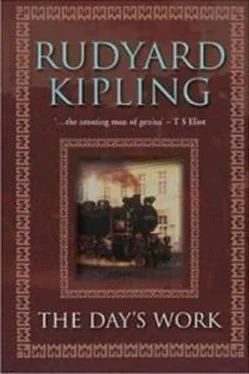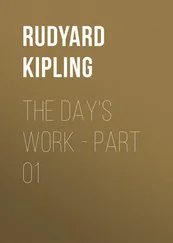The Day's Work - Volume 1
Rudyard Kipling
The least that Findlayson, of the Public Works Department, expected was a C. I. E.; he dreamed of a C. S. I.: indeed, his friends told him that he deserved more. For three years he had endured heat and cold, disappointment, discomfort, danger, and disease, with responsibility almost too heavy for one pair of shoulders; and day by day, through that time, the great Kashi Bridge over the Ganges had grown under his charge. Now, in less than three months, if all went well, his Excellency the Viceroy would open the bridge in state, an archbishop would bless it, and the first trainload of soldiers would come over it, and there would be speeches.
Findlayson, C. E., sat in his trolley on a construction line that ran along one of the main revetments—the huge stone–faced banks that flared away north and south for three miles on either side of the river—and permitted himself to think of the end. With its approaches, his work was one mile and three–quarters fin length; a lattice–girder bridge, trussed with the Findlayson truss, standing on seven–and–twenty brick pies. Each one of those piers was twenty–four feet in diameter, capped with red Agra stone and sunk eighty feet below the shifting sand of the Ganges' bed. Above them was a railway–line fifteen feet broad; above that, again, a cart–road of eighteen feet, flanked with footpaths. At either end rose towers of red brick, loopholed for musketry and pierced for big guns, and the ramp of the road was being pushed forward to their haunches. The raw earth–ends were crawling and alive with hundreds upon hundreds of tiny asses climbing out of the yawning borrow–pit below with sackfuls of stuff; and the hot afternoon air was filled with the noise of hooves, the rattle of the drivers' sticks, and the swish and roll–down of the dirt. The river was very low, and on the dazzling white sand between the three centre piers stood squat cribs of railway–sleepers, filled within and daubed without with mud, to support the last of the girders as those were riveted up. In the little deep water left by the drought, an overhead–crane travelled to and fro along its spile–pier, jerking sections of iron into place, snorting and backing and grunting as an elephant grunts in the timber–yard. Riveters by the hundred swarmed about the lattice side–work and the iron roof of the railway–line, hung from invisible staging under the bellies of the girders, clustered round the throats of the piers, and rode on the overhang of the footpath–stanchions; their fire–pots and the spurts of flame that answered each hammer–stroke showing no more than pale yellow in the sun's glare. East and west and north and south the construction–trains rattled and shrieked up and down the embankments, the piled trucks of brown and white stone banging behind them till the side–boards were unpinned, and with a roar and a grumble a few thousand tons more material were flung out to hold the river in place.
Findlayson, C. E., turned on his trolley and looked over the face of the country that he had changed for seven miles around. Looked back on the humming village of five thousand workmen; up stream and down, along the vista of spurs and sand; across the river to the far piers, lessening in the haze; overhead to the guard–towers—and only he knew how strong those were—and with a sigh of contentment saw that his work was good. There stood his bridge before him in the sunlight, lacking only a few weeks' work on the girders of the three middle piers—his bridge, raw and ugly as original sin, but pukka—permanent—to endure when all memory of the builder, yea, even of the splendid Findlayson truss, had perished. Practically, the thing was done.
Hitchcock, his assistant, cantered along the line on a little switch–tailed Kabuli pony who through long practice could have trotted securely over a trestle, and nodded to his chief.
"All but," said he, with a smile.
"I've been thinking about it," the senior answered. "Not half a bad job for two men, is it?"
"One–and a half. Gad, what a Cooper's Hill cub I was when I came on the works!" Hitchcock felt very old in the crowded experiences of the past three years, that had taught him power and responsibility.
"You were rather a colt," said Findlayson. "I wonder how you'll like going back to office–work when this job's over."
"I shall hate it!" said the young man, and as he went on his eye followed Findlayson's, and he muttered, "Isn't it damned good?"
"I think we'll go up the service together," Findlayson said to himself. "You're too good a youngster to waste on another man. Cub thou wart; assistant thou art. Personal assistant, and at Simla, thou shalt be, if any credit comes to me out of the business!"
Indeed; the burden of the work had fallen altogether on Findlayson and his assistant, the young man whom he had chosen because of his rawness to break to his own needs. There were labour contractors by the half–hundred—fitters and riveters, European, borrowed from the railway workshops, with, perhaps, twenty white and half–caste subordinates to direct, under direction, the bevies of workmen—but none knew better than these two, who trusted each other, how the underlings were not to be trusted. They had been tried many times in sudden crises—by slipping of booms, by breaking of tackle, failure of cranes, and the wrath of the river—but no stress had brought to light any man among men whom Findlayson and Hitchcock would have honoured by working as remorselessly as they worked themselves. Findlayson thought it over from the beginning: the months of office–work destroyed at a blow when the Government of India, at the last moment, added two feet to the width of the bridge, under the impression that bridges were cut out of paper, and so brought to ruin at least half an acre of calculations—and Hitchcock, new to disappointment, buried his head in his arms and wept; the heart–breaking delays over the filling of the contracts in England; the futile correspondences hinting at great wealth of commissions if one, only one, rather doubtful consignment were passed; the war that followed the refusal; the careful, polite obstruction at the other end that followed the war, till young Hitchcock, putting one month's leave to another month, and borrowing ten days from Findlayson, spent his poor little savings of a year in a wild dash to London, and there, as his own tongue asserted and the later consignments proved, put the fear of God into a man so great that he feared only Parliament and said so till Hitchcock wrought with him across his own dinner–table, and—he feared the Kashi Bridge and all who spoke in its name. Then there was the cholera that came in the night to the village by the bridge works; and after the cholera smote the Smallpox. The fever they had always with them. Hitchcock had been appointed a magistrate of the third class with whipping powers, for the better government of the community, and Findlayson watched him wield his powers temperately, learning what to overlook and what to look after. It was a long, long reverie, and it covered storm, sudden freshets, death in every manner and shape, violent and awful rage against red tape half frenzying a mind that knows it should be busy on other things; drought, sanitation, finance; birth, wedding, burial, and riot in the village of twenty warring castes; argument, expostulation, persuasion, and the blank despair that a man goes to bed upon, thankful that his rifle is all in pieces in the gun–case. Behind everything rose the black frame of the Kashi Bridge—plate by plate, girder by girder, span by span–and each pier of it recalled Hitchcock, the all–round man, who had stood by his chief without failing from the very first to this last.
Читать дальше












